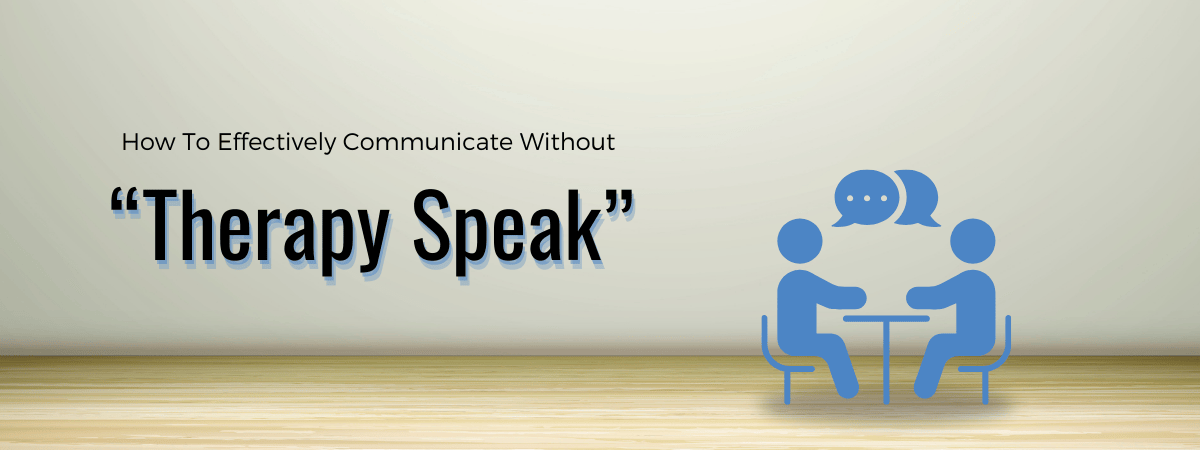

Why You Need To Avoid "Therapy Speak" in Regular Conversations
There’s been a greater focus on mental health in recent years, shifting once-taboo topics into public discourse. While this development is commendable, it has also initiated a complication that can impede valuable discussions: "therapy speak."
This type of discourse is misunderstood, overused, and taken beyond its true purpose by inexperienced individuals in routine situations and on social media sites like TikTok, Facebook, and more. Find out more about what defines therapy speak, how it impacts people, and explore tips on communicating about mental health support more effectively.
What Is Therapy Speak?
Therapy speak is a reference to utilizing psychological terms, often borrowed from counseling sessions, in regular conversations. Certain words and phrases have moved out of professional environments and become prevalent in headlines, hashtags, and, sadly, heated arguments between family.
When these terms are misconstrued in everyday communication, they can transform into a means to avoid more meaningful dialogue and detrimentally misinterpret complex emotions. They might even shut down valuable interactions with lingering negative results, as individuals with no experience or credentials could improperly diagnose themselves or others they care about.
Here are a few cases of therapy speak:
- “I’m setting a boundary,”
- “That’s triggering for me,”
- “Are you doing the work?”
- “Is it a safe space?”
- “Maybe you’re processing your trauma.”
While these expressions can be helpful and rewarding within a therapeutic setting at a credentialed facility like The Counseling Center, they are often inappropriate in day-to-day life.
Therapy Speak Can Dilute Genuine Conversation
At TCC, we support incorporating mental health practices into daily life. But, we also recognize the potential drawbacks of adopting clinical or jargon-heavy language outside therapeutic settings. Relying on therapy speak can dilute the genuine intent of conversations, creating obstacles instead of fostering a shared understanding. We’ve found people increasingly utilize therapy speak as a shield.
There might be a feeling that therapy speak can’t be challenged since it mimics what you may hear at a treatment center. Yet effective conversation needs empathy, active listening, and shared understanding.
The Impact of Therapy Speak
1. Eroding Real Connections
Overusing therapy speak can make interactions appear impersonal or clinical, eliminating the personal touch that fosters genuine connection. It may “therapize” family interactions, converting worthwhile face-to-face discourse into what could sound like a 20-second reel generated by a mental health practitioner on TikTok.
To illustrate, telling someone close to you, “I really must hold space for myself right now,” may feel formal and aloof compared to merely saying, “I’m feeling stressed out and need a bit of time to think things over.”
2. Misuse and Misunderstanding
Therapeutic expressions have precise meanings within clinical contexts. Misusing words like ”narcissistic” or “bipolar” not only trivializes their real meaning but can also perpetuate stigma around mental health conditions. People attempt to label others instead of being attentive and allowing time for authentic conversation.
The Counseling Center supports carefully considered language that respects the importance of words used in clinical settings, with the intent that they are not misapplied or diluted in day-to-day conversations. We find that therapy speak typically breeds confusion, with many words used improperly. This language can function as a shield to safeguard us from guilt, judgment, or obligation.
3. Avoiding Accountability
Although concepts like boundaries and self-care are important, therapy speak is often misapplied to deflect responsibility or avoid accountability. For example, saying, “I’m protecting my boundaries,” to justify unhealthy behavior can take away from the honesty and trust needed in mutually beneficial relationships. There are always fresh words to justify selfish or even aggressive behaviors. The phrase “boundaries” has become particularly vexing to mental health therapists.
You now hear therapeutic phrases used when people simply don’t want to do something. With all the disputes that result, you might ask if your “boundary” has more significance than your personal relationship.
How to Communicate Effectively Without Therapy Speak
We feel genuine communication doesn’t need clinical terminology. Rather, it’s about being honest, clear, and compassionate. Our counselors have additional practical tips to help:
1. Express Yourself From the Heart
Emphasize how you feel rather than depending on clinical terms when communicating emotions. To illustrate:
- Rather than: “You’re gaslighting me.”
- Try: “Whenever you say that, it makes me feel like my perspective isn’t being acknowledged.”
2. Put An Emphasis On Understanding
Aim to listen attentively rather than label behavior. Expressions like “Help me see where you’re coming from” encourage constructive communication.
3. Be Aware of Your Audience
Keep in mind that not every individual is familiar with professional terms. Choosing plain, understandable language ensures your message resonates more effectively.
4. Use Boundaries Sparingly
Boundaries are essential, but they need to be communicated thoughtfully. Instead of: “I’m setting a boundary.” Try: “I must step away from this conversation for now so I can think about it.”
Therapy offers tools, not jargon-heavy scripts. Counselors at TCC frequently assess how you’re applying what you’ve been taught to ensure it boosts, rather than diminishes, your relationships.
How The Counseling Center Helps Foster Effective Communication
At The Counseling Center, we work to equip patients with the abilities they need to handle their mental health while building healthier relationships. Our services include:
- Individual Therapy: One-on-one sessions to build self-awareness and boost emotional intelligence.
- Family and Couples Therapy: Helping partners and family members communicate more effectively and resolve conflicts constructively.
- Group Therapy: Providing a safe space for genuine communication in a nurturing setting. Our counselors stress helpful, everyday applications of therapeutic ideas, ensuring you can engage meaningfully with others without falling back on jargon.
Request Professional Mental Health Support Today
If you’re ready to strengthen your understanding of who you are and improve your relationships, we’re ready to help. Learn more about our intensive outpatient and outpatient support. If you require help immediately, please contact our 24-hour hotline at 833-248-6271. Working together, we can empower you to communicate with clarity, purpose, and empathy—without losing who you are.
-1.jpg?t=1663075584)


